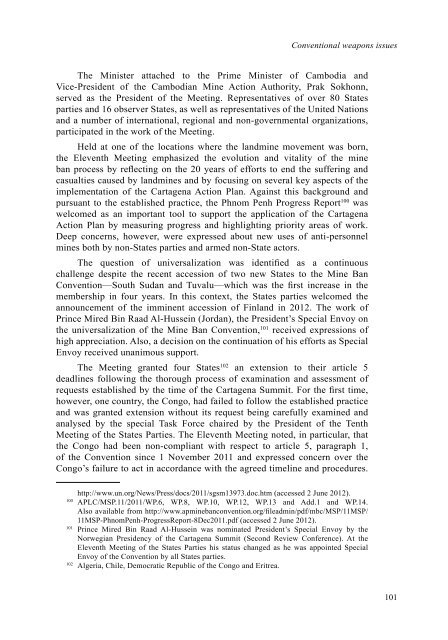DYB2011-Part-II-web
DYB2011-Part-II-web
DYB2011-Part-II-web
You also want an ePaper? Increase the reach of your titles
YUMPU automatically turns print PDFs into web optimized ePapers that Google loves.
Conventional weapons issues<br />
The Minister attached to the Prime Minister of Cambodia and<br />
Vice-President of the Cambodian Mine Action Authority, Prak Sokhonn,<br />
served as the President of the Meeting. Representatives of over 80 States<br />
parties and 16 observer States, as well as representatives of the United Nations<br />
and a number of international, regional and non-governmental organizations,<br />
participated in the work of the Meeting.<br />
Held at one of the locations where the landmine movement was born,<br />
the Eleventh Meeting emphasized the evolution and vitality of the mine<br />
ban process by reflecting on the 20 years of efforts to end the suffering and<br />
casualties caused by landmines and by focusing on several key aspects of the<br />
implementation of the Cartagena Action Plan. Against this background and<br />
pursuant to the established practice, the Phnom Penh Progress Report100 was<br />
welcomed as an important tool to support the application of the Cartagena<br />
Action Plan by measuring progress and highlighting priority areas of work.<br />
Deep concerns, however, were expressed about new uses of anti-personnel<br />
mines both by non-States parties and armed non-State actors.<br />
The question of universalization was identified as a continuous<br />
challenge despite the recent accession of two new States to the Mine Ban<br />
Convention—South Sudan and Tuvalu—which was the first increase in the<br />
membership in four years. In this context, the States parties welcomed the<br />
announcement of the imminent accession of Finland in 2012. The work of<br />
Prince Mired Bin Raad Al-Hussein (Jordan), the President’s Special Envoy on<br />
the universalization of the Mine Ban Convention, 101 received expressions of<br />
high appreciation. Also, a decision on the continuation of his efforts as Special<br />
Envoy received unanimous support.<br />
The Meeting granted four States102 an extension to their article 5<br />
deadlines following the thorough process of examination and assessment of<br />
requests established by the time of the Cartagena Summit. For the first time,<br />
however, one country, the Congo, had failed to follow the established practice<br />
and was granted extension without its request being carefully examined and<br />
analysed by the special Task Force chaired by the President of the Tenth<br />
Meeting of the States <strong>Part</strong>ies. The Eleventh Meeting noted, in particular, that<br />
the Congo had been non-compliant with respect to article 5, paragraph 1,<br />
of the Convention since 1 November 2011 and expressed concern over the<br />
Congo’s failure to act in accordance with the agreed timeline and procedures.<br />
http://www.un.org/News/Press/docs/2011/sgsm13973.doc.htm (accessed 2 June 2012).<br />
100 APLC/MSP.11/2011/WP.6, WP.8, WP.10, WP.12, WP.13 and Add.1 and WP.14.<br />
Also available from http://www.apminebanconvention.org/fileadmin/pdf/mbc/MSP/11MSP/<br />
11MSP-PhnomPenh-ProgressReport-8Dec2011.pdf (accessed 2 June 2012).<br />
101 Prince Mired Bin Raad Al-Hussein was nominated President’s Special Envoy by the<br />
Norwegian Presidency of the Cartagena Summit (Second Review Conference). At the<br />
Eleventh Meeting of the States <strong>Part</strong>ies his status changed as he was appointed Special<br />
Envoy of the Convention by all States parties.<br />
102 Algeria, Chile, Democratic Republic of the Congo and Eritrea.<br />
101


